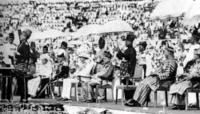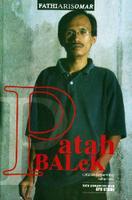Sekali dengar kata-kata ini sama sahaja dengan "merdeka!", "merdeka!", "merdeka!".
Apakah inti kemerdekaan itu ke-menderhaka-an?
 Seorang teman blog Shin Shin mengirim sejumlah soalan (sembilan semuanya) yang menarik kepada beberapa teman blog yang lain, antaranya kami saling mengenali seperti Ong BK dan Zulhabri. Teman-teman blog yang lain termasuklah Rajan Rishyakaran, Tauke Fooji, Emmanuel Joseph, Sharizal Sharaani dan Politics 101
Seorang teman blog Shin Shin mengirim sejumlah soalan (sembilan semuanya) yang menarik kepada beberapa teman blog yang lain, antaranya kami saling mengenali seperti Ong BK dan Zulhabri. Teman-teman blog yang lain termasuklah Rajan Rishyakaran, Tauke Fooji, Emmanuel Joseph, Sharizal Sharaani dan Politics 101Berikut saya salin kembali jawapan saya kepada dua soalan pertama:
Shin: The British have left the country for 48 years, but many of their policies including the notorious Internal Security Act (ISA), divide and rule, restrictions on mother tongue education are still largely intact. In the aspects of press freedom and local elections, it’s much worse than it was 48 years ago. In your opinion, are we truly independent?
Fathi: I guess the issue is becoming a cliché, almost every year we ask and argue the same question – for instance, “are we independent”? [laughing] We have to recognise a simple fact that a democracy (or, politics in any country) is a complex, dynamic process.
So if you have already achieved a comparatively freer political setting, it does not necessarily last long.
If you study the history of post-colonial Burma and the Philippines, you can see such dynamics. If you look at Indonesia’s post-Soeharto democracy, it will appear to you that a democracy is relative.
I am not an apologetic to the Malaysian current state of political affairs, but we can say that freedom has to be fought for over and over. It is not static, ‘given’ once and for all!
Democracy, even when it is practised democratically, can have paradoxes, problems and contradictions. See Frank Cunningham’s Theories of Democracy: A Critical Introduction (2003).
Shin: Many including former teachers in Malay College Kuala Kangar (MCKK) hold the opinion that, the level of national unity and academic results were much better when the medium of instruction was English. Once it was switched to Bahasa, it’s downhill all the way. Does this mean the national language cannot unite the citizens efficiently ?
Fathi: I don’t think the issue is language, bahasa Malaysia or English. I prefer to say the pivotal issue here is democratic freedom. Read George Orwell’s brief comment on this issue, Politics and the English Language (1946). For the New Order’s Indonesian control of language and thoughts, we may refer to this latest book, Social Science and Power in Indonesia (2005).
 If you can’t express many things, if you cannot explore your creative freedom freely (literature, for example), if you have some ideas but no effective medium of public expression and exchange (no free press or academic freedom), if our society kills debate and critical thinking, if intellectuals fail (or refuse) to challenge the powers that be (that is, no serious debates on matters of public importance), what is happening to our language?
If you can’t express many things, if you cannot explore your creative freedom freely (literature, for example), if you have some ideas but no effective medium of public expression and exchange (no free press or academic freedom), if our society kills debate and critical thinking, if intellectuals fail (or refuse) to challenge the powers that be (that is, no serious debates on matters of public importance), what is happening to our language?I tend not to agree with the former teachers in MCKK. I guess they perceive these issues wrongly or narrowly.
I notice bahasa Malaysia can be a medium of excellence too. But when our freedom and democracy are slowly eroded, a decade after another (see these important dates: post-May 13, 1969, the 22-year rule under Dr Mahathir Mohamad and post-1998 political crises), what has happened to our language use and our thoughts?
Even English-speaking Malays and Malaysians, urbanites and professionals, are ’stupid’ (or: shallow, conservative, uncritical and ignorant)!
Do you read ‘letters section’ of Malaysiakini.com – and do you think these English-speaking letter writers are ‘good’? Have you noticed how people express and argue in The Star, The New Straits Times and even Kakiseni.com?
Even those who study overseas (Malays or non-Malays) are more or less inflicted with this Malaysian disease of mediocrity! Language use is not about words and vocabulary. It is about ideas and how you relate, analyse, what is happening around you (societal realities).
Language and excellence are not spontatenous. People, here, assume (repeat: assume) English is more superior to bahasa Malaysia because the former is more intellectually developed and internationally recognised.
But when you try to transmit the intellectuality of English to a lesser democratic environment (when you are subjected to unfair, conservative, undemocractic constraints) – it may have different impact. It is the context of intellectuality (or intellectual development) in a certain political climate that provides the excellence of language use (and, thoughts).
 But language can be a good (and very effective, too!) tool for thought-control, propaganda and misinformation. See Murray Edelman’s The Politics of Misinformation (2001, 2004) and Pierre Bourdieu’s Language and Symbolic Power (1991, 2001).
But language can be a good (and very effective, too!) tool for thought-control, propaganda and misinformation. See Murray Edelman’s The Politics of Misinformation (2001, 2004) and Pierre Bourdieu’s Language and Symbolic Power (1991, 2001).If you ask some Malay intellectuals, who can use equally well bahasa Malaysia and English, e.g. Rustam A Sani, Hishamuddin Rais or Khalid Jaafar — they will agree with me. That is, nothing is special in English-speaking Malays’ (or, non-Malays’) discourse and understanding.
What I try to conclude is simple indeed — it is democratic freedom, not the language use, which hinders excellence.
You said: “Once it was switched to Bahasa, it’s downhill all the way.” But can you also notice the downhill of our democratic space?
[Shin: Yes, definitely…]
Fathi: So, I believe there is strong correlation between political authoritarianism (especially the 22-year rule of Dr Mahathir’s), plus religious fundamentalism, and thought-control and language use.
I try to explain, though still simple and inadequate, in some of my pieces in my Malaysiakini.com column, e.g. ‘Akar Umbi Pembodohan Umno’ (23 August 2003), ‘Politik dan Kejahatan Berbahasa’ (8 August 2005) and the most recent one ‘Kebodohan Umum di Indonesia’ (22 August 2005).
 If you read my book Patah Balek: Catatan Terpenting Reformasi (Feb 2005), you will notice that the issues are dealt with quite extensively.
If you read my book Patah Balek: Catatan Terpenting Reformasi (Feb 2005), you will notice that the issues are dealt with quite extensively.I still believe, none the less, that my analyses are still superficial. I try to remind people that we have to deal with these issues (i.e. language, public discourse and thought control) because they are equally important in our democratic struggle; not cases of human rights violations only (for instance).
Untuk enam lagi soalan dan jawapan teman-teman blog yang lain, sila ke laman web My Shin Shin, siri 1 (Apakah kita sudah merdeka?), siri 2 (Bahasa, kecemerlangan), siri 3 (Politik perkauman, pendidikan dan perpaduan), siri 4 (Kontrak sosial) dan siri 5 (Islam, perlembagaan dan hak asasi).
Nota: Jeff, terima kasih banyak-banyak kerana mengambil inisiatif wawancara ini. Elok jika dapat dikongsikan kepada khalayak pembaca dan teman-teman blog yang lain. Dan ... maaf juga kerana jawapan-jawapan saya yang "kurang ajar" ... hehehe Saya sangka asal kata merdeka itu menderhaka! Maaf, ya Jeff ...
Anda tidak perlu bersetuju dengan pandangan saya, atau kami, dan silakan nyatakan suara anda di ruangan komentar di penjuru kanan (bawah) selepas ayat terakhir ini ...



6 comments:
Jika anda gagal meng-klik soalan-soalan di atas, sila ke blog Shin Shin,
http://myshinshin.blogsome.com/
To Tomsoya: Yes, that was what I told the interviewer (Question # 9 -- will be published later) faomar@yahoo.com
Nice site!
[url=http://vdymmbhn.com/mvlv/cpwe.html]My homepage[/url] | [url=http://hheafuuu.com/fypj/maay.html]Cool site[/url]
Nice site!
My homepage | Please visit
Nice site!
My homepage | Please visit
Thank you!
http://vdymmbhn.com/mvlv/cpwe.html | http://kodedxqq.com/wndo/ogjr.html
Post a Comment